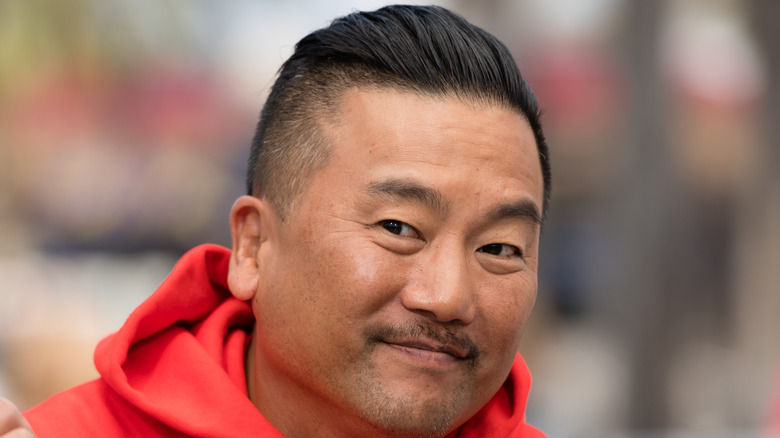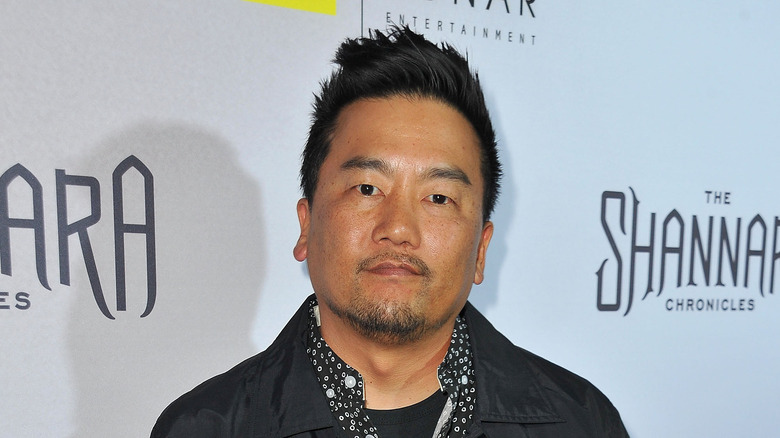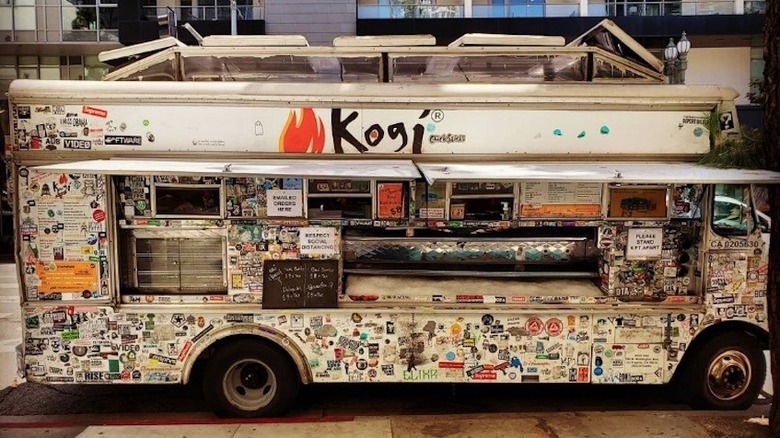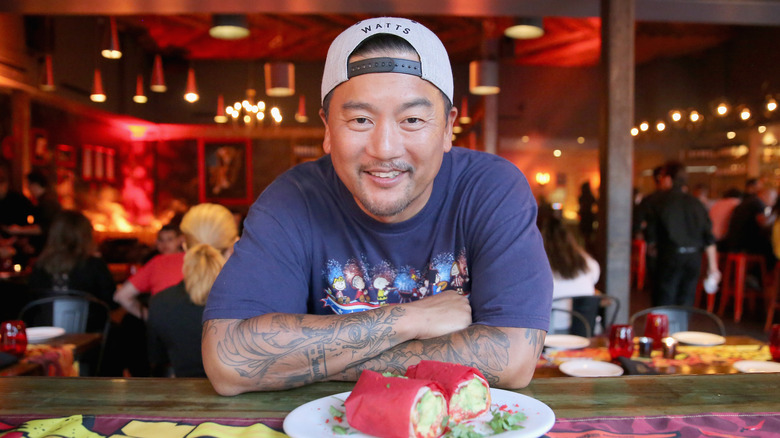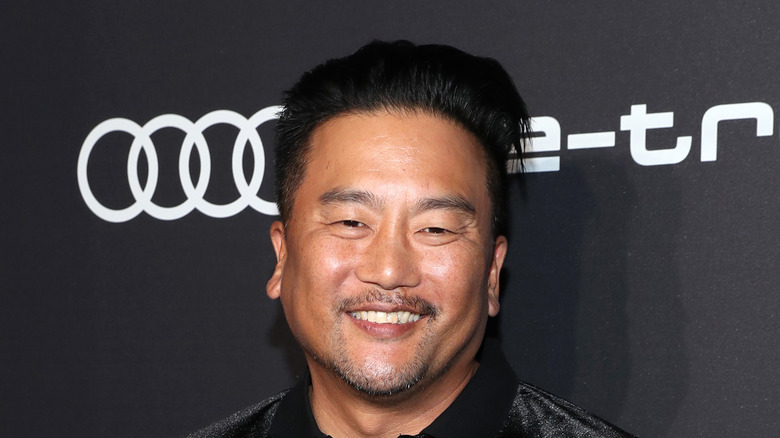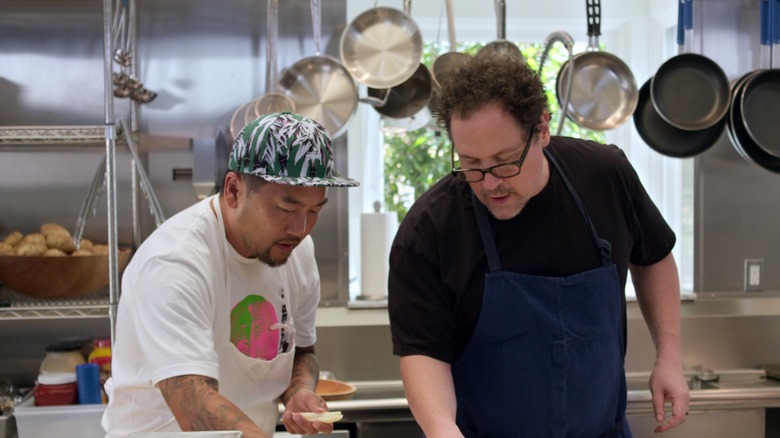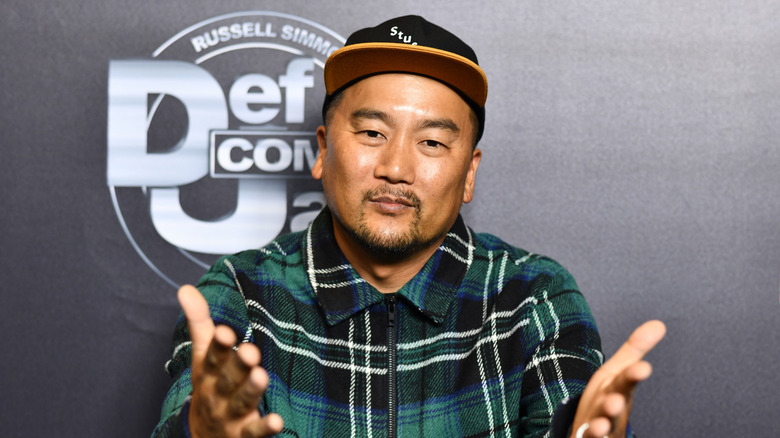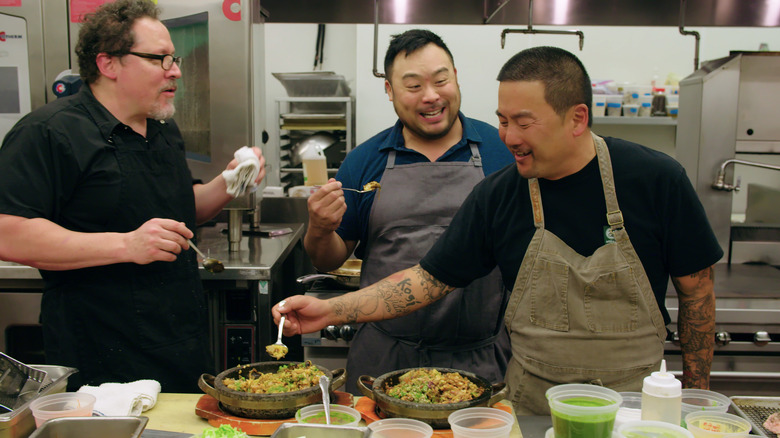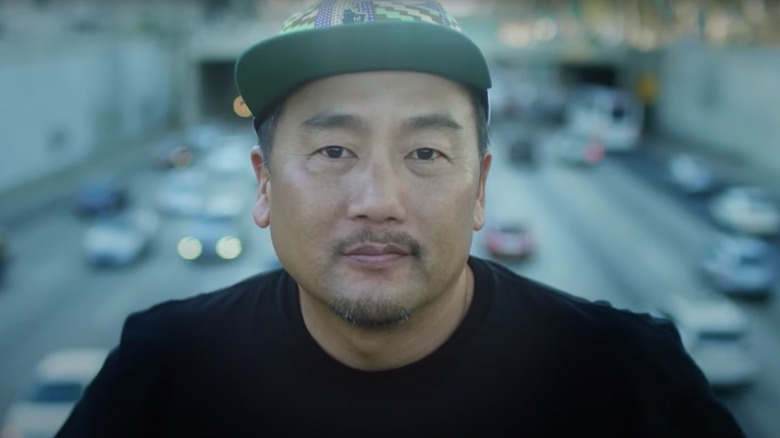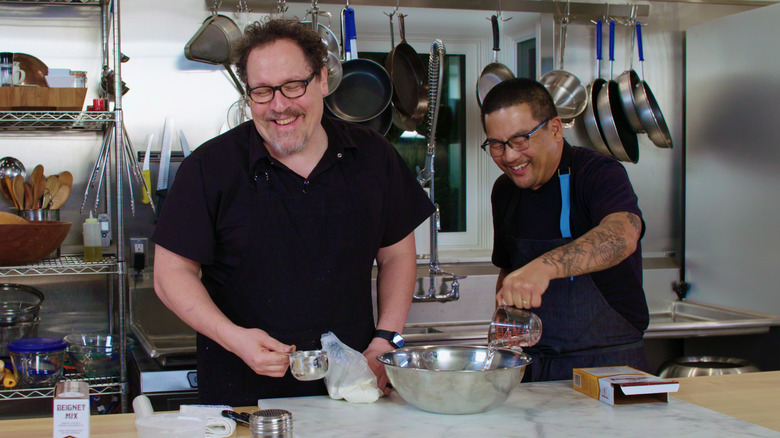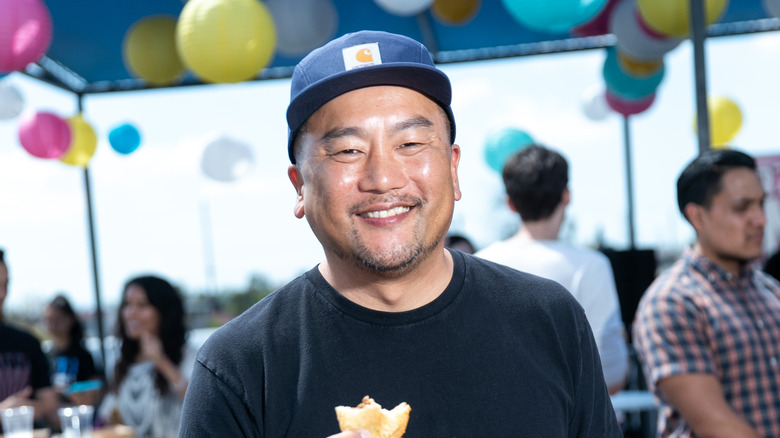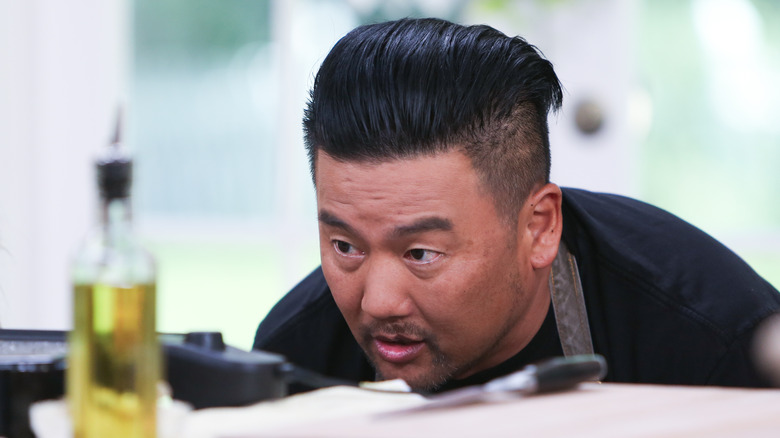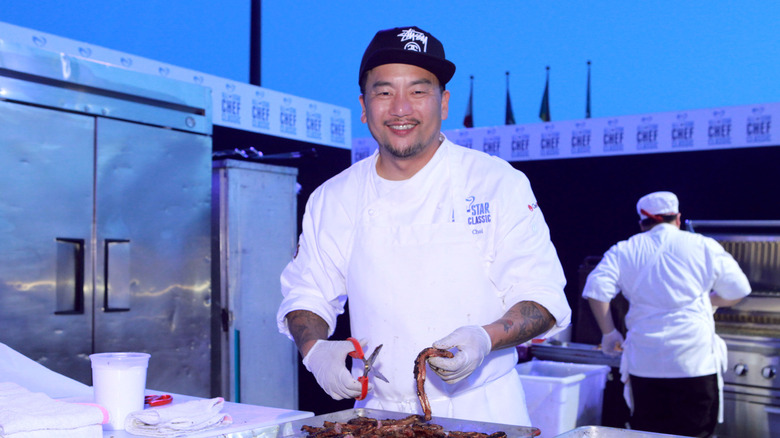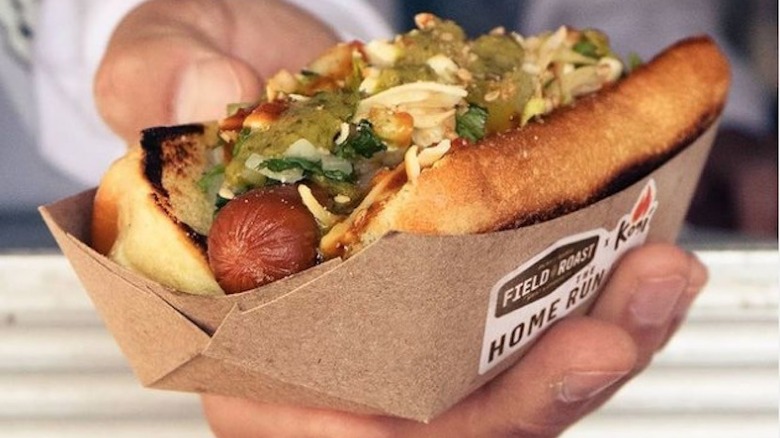The Untold Truth Of The Chef Show's Roy Choi
Roy Choi had been working as a professional chef in Los Angeles when the 2008 economic downturn left him jobless. With no other prospects, he seized an opportunity to make a few bucks by selling tacos from a truck. This was the humble beginning of what became his Kogi food truck empire and his entry into the upper echelons of American culinary culture.
As Choi's bio points out, he was eventually named Food & Wine magazine's Best New Chef for 2010, his 2013 memoir and cookbook "LA Son" became a New York Times bestseller, and in 2016 he made the TIME 100 list of the "Most Influential People in the World." In addition to Kogi BBQ, Choi's other restaurant ventures include Chego!, Best Friend at Park MGM Las Vegas, and LocoL (the latter, in fact, received the inaugural LA Times Restaurant of the Year award in 2017). Meanwhile, Netflix viewers are also familiar with Choi from the critically-acclaimed series "The Chef Show," in which he and actor-director Jon Favreau explore their fascination with food.
And yet Choi's star continues to rise. Learn more about this fascinating food guru with the untold truth of "The Chef Show's" Roy Choi.
He was at a low point when he was saved by food
To say that Roy Choi's path to culinary stardom was unconventional is a massive understatement. In fact, a career in the kitchen was the furthest thing from Choi's mind during his 20s, as he told Ask Men. According to Choi, he was then lost in a haze of "drugs and gambling" that sent him "spiraling into anxiety, depression, and addiction" during a five-year period. Having hit rock bottom, Choi was channel-surfing when he came across an episode of famed chef and TV personality Emeril Lagasse's Food Network show "Emeril," one that sparked a journey of transformation.
"At my lowest point, I found cooking," Choi explained. "I was watching TV and saw the Emeril show and it spoke to me. I went out and started researching the culinary world and chefs that I knew nothing about. Then I moved to New York and went to culinary school, and everything just fit like a glove. It's been on ever since."
Choi didn't attend culinary school but was accepted into the prestigious Culinary Institute of America. This ultimately led to an externship at famed Manhattan restaurant Le Bernardin and a job at the swanky Beverly Hilton in Los Angeles.
Choi helped pioneer the food truck trend
Roy Choi was 38 years old and had just lost his job, reports Inc. That's when a former Beverly Hilton co-worker called him out of the blue to pitch an idea: selling tacos out of a truck. As Choi recalled, it wasn't like there were any other options staring him in the face. "I was so scared," he admitted. "I have a family and I didn't know what else I was going to do."
As Thrillist recounted, Choi used this time to experiment with flavor, like combining Korean barbecue short ribs with more traditional Mexican salsas packed into corn tortillas. Dubbed Kogi, the taco truck soon built up a following in Los Angeles. Choi used Twitter — then in its infancy — to let people know where the truck would be on any given day. "When we post our location, there will be hundreds and hundreds of people waiting there in their cars," Choi told Inc. The runaway success of Kogi inspired other chefs to follow his lead, and so the food truck revolution was born.
Roy Choi was definitely a late bloomer
Given that Roy Choi didn't begin to experience fame and fortune from his Kogi food truck until he was in his 40s, it's safe to say he was no overnight sensation. "I guess the moral of the story is sometimes, it takes 30 years to get there, but it doesn't mean you can't get there," Choi told Ask Men. "Sometimes people are lucky, and they get there at 16 or 17. But sometimes you get there at 36 or 38, and it opens up a whole new world."
Then again, becoming rich and famous may actually have been part of Choi's destiny all along. "When I was messing up in my twenties, my mom went to the fortune teller to be like, 'What's gonna happen to my son?' you know," Choi revealed in an interview with VENN Plays. According to Choi, the soothsayer predicted his future food-truck success, although nobody really understood it at the time. "The fortune teller told them, 'I see your son in a parking lot, surrounded by people, and he has money in both hands, and he's eating something,'" Choi recalled.
Nobody's more surprised by Choi's TV fame than he is
Roy Choi was already considered a culinary rock star when he was approached by Jon Favreau. The actor-director wanted Choi to join in on the project that would eventually become Netflix's "The Chef Show." Looking back on his early life, Choi admitted in an interview with Grub Street that he had never envisioned the kind of fame he would eventually experience, let alone becoming a television star.
"I've been a shy kid for almost four decades now of my life," Choi said. "And I'm ready for the second chapter of my life. I've got a lot to share with the world. I just didn't know how I could share it. It just all came together in one year, and I'm not going to shy away from it anymore."
Despite the unlikeliness of his fame, Choi told Men's Journal that his celebrity status was never the goal, but a means to an end. "I'm taking it all the way to challenge traditional cooking and show you who I am... there is nothing safe with what I do," he said.
Roy Choi had some conditions for Jon Favreau
Before Roy Choi joined Jon Favreau on Netflix's "The Chef Show," the actor and director had tapped him as a consultant on his 2014 movie, "Chef." In the film, Favreau starred as a top chef whose hot temper leaves him jobless, ultimately rediscovering his love of cuisine via his own Kogi-style food truck.
As Choi told the Los Angeles Times, he had one key condition that needed to be met before he would agree to sign on. "You're not coming into my kitchen until you're trained," Choi said he told Favreau, who lived up to his end of the bargain by spending a week in a "culinary school crash-course" before Choi put him to work in his kitchen. "I had him work an eight-hour shift, just prepping," Choi said. "You can't make a movie about a chef if you don't understand what it is to be a cook."
Ultimately, both Choi and Favreau shared the same goal of portraying cooking as authentically as they possibly could on camera. "I told him, 'If I'm going to do this, we really need to honor the craft and the code of cooking,'" Choi explained.
The 10 dishes that made his career
From the outside looking in it may have appeared that Roy Choi emerged fully formed as a superstar chef, but that definitely didn't take place within a vacuum. Talking to First We Feast, Choi detailed the 10 specific and eclectic foods that influenced him. Interestingly enough, only three of those 10 dishes reflect his Korean heritage. These include his mother's recipe for spicy tofu, kimchi jigae from L.A. restaurant Chosun Galbee, and galbi (marinated beef short ribs).
Some of the other dishes come from various eateries in L.A., including the chili tamale from famed Tommy's Hamburgers (his father's favorite), and the tacos and burritos from Koreatown's La Chabelita (which he acknowledged aren't the best, but have a certain "sloppiness" that he's always found appealing).
Rounding out the 10 are milkshakes, liquor-store beef jerky, Church's Chicken fried chicken, Caprese salad from Tra Vigne in the Napa Valley, and the black truffle ahi tuna at Le Bernardin in New York City, a dish that he "cooked every single day" during his post-culinary school externship at chef Eric Ripert's famed establishment.
Roy Choi sees The Chef Show as a return to old school
Roy Choi and Jon Favreau formed a bond while working on "Chef" that deepened when they reunited for "The Chef Show," in which the duo explore various types of cuisine with special guests, ranging from acclaimed chefs to Hollywood stars.
As the two shared in a joint interview with Eater, the ulterior motive behind developing "The Chef Show" was so these two busy friends could actually schedule some time to hang out together. However, Choi also had a very specific template in mind as to what kind of show it was going to be. According to Choi, he envisioned a throwback series, "going back to the essence of the original cooking-to-camera shows," citing such TV cooking personalities like Paul Prudhomme, Julia Child, and Emeril Lagasse, with a bit of Favreau's celebrities-in-conversation series "Dinner for Five" tossed in the mix.
That, explained Choi, formed the basis of "The Chef Show." All they needed to do, he said, was "Put on the camera, get some food, start cooking, invite some friends over, and let's see where it goes."
He hosts his own show exploring food activism
Around the same time that viewers were introduced to "The Chef Show," Choi also debuted his own solo show on California's KCET. Titled "Broken Bread," the series ventured beyond cuisine, using food as a jumping-off point for Choi to discuss things like food accessibility, waste, and culinary reform in his native Los Angeles.
"This show in a way is a bit of a battle cry," Choi told the Los Angeles Times. While "The Chef Show" is the more traditional cooking show that he'd envisioned, "Broken Bread" allowed him to explore his "activist side."
He also shared his not-immodest goal for his high-minded series. "My dream is that 'Broken Bread' becomes the hottest show on TV," he declared, before saying "that what we're covering will drive popular culture, the idea of loving and caring and challenging these problems." The way Choi saw it, if "Broken Bread" did indeed gain enough viewers to become a hit, "then other studios will say, 'We need a social justice show as well,' and that will drive the conversation and the marketplace."
Roy Choi believes in happy accidents
When it came to shaping "The Chef Show," Roy Choi told Uproxx, he decided to take a spontaneous approach. "I think there really wasn't any format," said Choi. "It was just 'turn the camera on and see what we get."
That philosophy mirrors Choi's feelings about the unexpected, particularly when that happens in the kitchen. Rather than viewing such accidents as mistakes, Choi instead sees them as an opportunity for further culinary exploration that could uncover something interesting or even truly special. If nothing else, he says, it's all part of the process. "I'm sure there are a lot of things in food shows that don't turn out right but they either don't make it to the screen or maybe they'll make it in some sort of outtake or something," he said. "But that just shows the character of the show right there. They're not really mistakes [...] That's all just a part of cooking."
Choi never leaves home without his cooking kit
Roy Choi operates with a certain degree of spontaneity and never knows when he might need to step in and cook something. As a result, he's never without his trusty backpack, which he opened up for Hypebeast to showcase the assortment of key kitchen tools packed within. Containing knives, a pair of chopsticks, and a spatula, among other things, Choi's mobile cooking kit provides him with the ability to whip up a delicious dish on the fly, wherever he happens to be.
Choi's cooking kit also contains a small-but-effective cadre of seasonings, including a trio of small containers labeled "Sweety, "Spicy," and "Cheesy." According to Choi, those spice mixes are prototypes for products that he was eager to market, explaining that those specially blended concoctions are like "taking the whole spice rack at the market and distilling it down to three magical potions."
In addition, Choi — who characterizes himself as "a hot sauce fiend" with more than a dozen bottles of the stuff in his fridge — also packs a bottle of Tapatio hot sauce in his cooking kit.
He doesn't believe failure is real
As Choi explained to GQ, he's certainly experienced his fair share of failures throughout his career, but he doesn't necessarily see them that way. "But none of those failures have come about because of a lack of effort," he explained. "Even up until the last day of the failure, it's still trusting the vision and going all the way."
Not surprisingly, he measures success in a similar way. While his business partners may utilize specific financial metrics to determine whether a business is successful, Choi has his own set of criteria that have nothing to do with money. "I believe when I walk in the street, when I taste the food, when I see the staff, when I walk into the kitchen, when I see the faces, the level of the music, the feeling in the room — all those things, if they're working really well and there's energy behind it, then even if the business may be down, the spirit is still strong," he said.
He embraced a 'psychedelic' business plan
Conventional wisdom dictates that Choi should transform from a food-truck cult hero to an international culinary sensation. Choi, however, doesn't see it that way. While his projects may be larger and more expansive in scope, he told GQ, he still approaches everything he does "with that same energy and passion and rawness of selling one taco on the street." At the same time, his primary goal has remained unchanged, with everything he does fueled from "the purity of making people happy."
He's also a firm believer in laying all his cards down on the table so prospective investors and partners know exactly who they're dealing with, telling them, "This is what I do, this is who I am, there's no business plan."
What plan there is, he explained, isn't based on the potential for financial gain, but on what he calls a "different type of currency, the currency of connectivity and love and nourishment and caring and giving a s**t about each other," he added. "That's the business. It's very psychedelic in many ways."
Roy Choi began using plant-based meat
Roy Choi may have established his culinary identity with beef short rib tacos, but recently he's taken a different view of meat. In a 2021 interview with Vice, he detailed his new "flexitarian" approach of eating less meat while developing new dishes that incorporate plant-based protein. "You don't have to eat animal meat every single day," he explained.
That was why Choi partnered with Field Roast for the company's "Make Taste Happen" campaign, encouraging foodies to explore plant-based alternatives to meat. The motivations range from health to environmental concerns, but Choi identified another: flavor. Noting that both the science and the culture behind plant-based protein had been "really evolving," Choi had become a big fan of its taste as well. Plant-based protein, he declared, "is getting so good, it's at the internet deep-fake stage, almost where we can't tell the difference."
In fact, he added, choosing a meat-free alternative now means "you don't have to make a sacrifice."
He debuted a vegetarian hot dog at Dodger Stadium
Choi's commitment to using plant-based alternatives to meat wasn't just lip service. In the summer of 2021, he debuted a new vegetarian hot dog at Dodger Stadium in Los Angeles. The result of his partnership with plant-based protein manufacturer Field Roast, the Field Roast Signature Stadium Dog boasts a rich, smoky flavor and bragging rights as the first plant-derived hot dog made from peas, not soy.
Choi told Inside Hook that the move is part of the ongoing responsibility he feels to "influence people to make better choices." Given the ubiquity of the humble hot dog within American culture, he explained that he wanted to "make it so delicious people wouldn't notice the difference between eating a meat hot dog and a plant-based hot dog. This is the first time I've ever had a hot dog that's completely plant-based where I eat it and don't think it's not meat."
